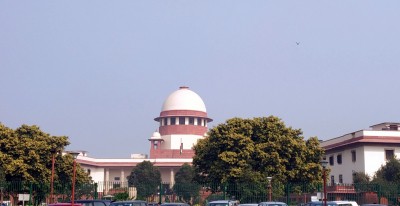New Delhi, Feb 5 : Come this March 8, the Supreme Court is most likely to resume physical hearings after the Covid-19 pandemic pushed it into revolutionary changes, leading it to taking up cases virtually to meet the persistent demands of justice. In March last year, the apex court departed from its usual practice as it sought to mainstream technology into the justice delivery system.
On March 8, a Constitution Bench will begin the hearing the final arguments against the reservations for the Maratha community in education and jobs, as legislated by the Maharashtra Assembly in November 2018. This decision on reservation was upheld by the Bombay High Court in June 2019, but in September 2020, the top court put the decision in abeyance, following appeals against the High Court order.
On Friday, a bench headed by Justice Ashok Bhushan and comprising Justices L. Nageswara Rao, S. Abdul Nazeer, Hemant Gupta, and S. Ravindra Bhat, said it will begin the hearing in the matter on March 8 in a hybrid manner. “If physical hearing starts by then, then hearing through physical mode, and those who want to appear through video conference can argue through it,” it said.
Amid the brief hearing, Justice Rao, in a light-hearted comment, told senior advocate Mukul Rohatgi, representing the Maharashtra government, that the court has been missing him physically for nearly a year.
Rohatgi replied that the Attorney General could use his power to make Covid vaccine available to judges and senior lawyers, as a lot of vaccines were “going waste” because of the lower-than-expected number of recipients.
On December 9, the top court had refrained from modifying the stay order in implementing reservation for Marathas in job and education in Maharashtra.
“We are of the view that looking into the issues raised in this appeal and the consequences to the followed, it is necessary that final hearing of this appeal be completed as early as possible. One of the issues before this Constitution Bench being interpretation of Constitution (One Hundred Second Amendment) Act, 2018,” it had said.
The petitioners have challenged the Bombay High Court judgement passed in June 2019. They have contended that the Act, which provides for 12 percent and 13 percent quota to Maratha community in education and jobs, respectively, violated the principle laid in the 9-judge bench judgement of the apex court in 1992, which capped the reservation at 50 percent. The High Court had upheld the Maratha quota, where it ruled that reservation should be 12 percent in jobs and 13 percent in education.
Disclaimer: This story is auto-generated from IANS service.

